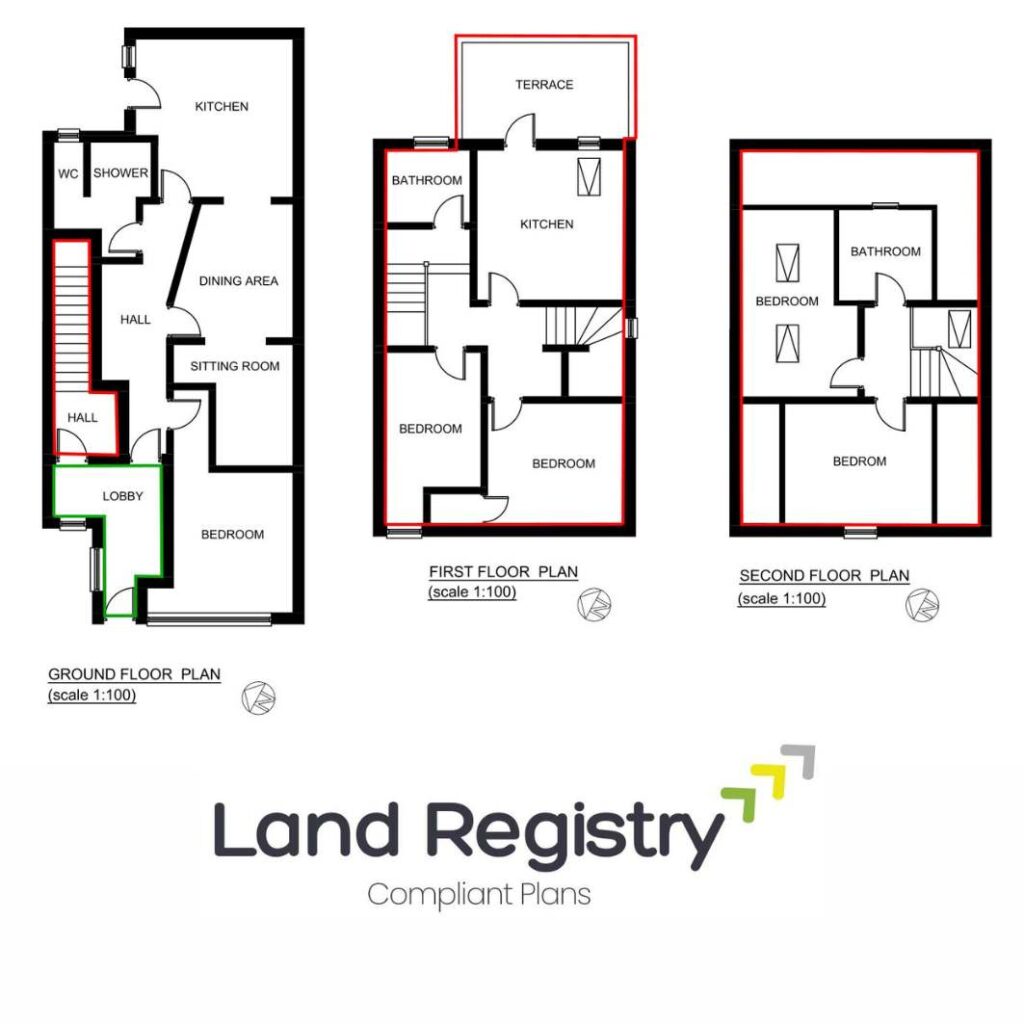The Land Registry Hub: Your Go-To Guide for Property Plans & Conveyancing
🛠️ Navigating the world of Land Registry, lease plans, title plans, and conveyancing can feel like a legal maze—but don’t worry, we’ve got you covered! Whether you’re a property owner, landlord, solicitor, or just someone trying to make sense of UK property rules, this blog is your one-stop resource for clear, practical advice.
From understanding lease plans to avoiding common conveyancing pitfalls, we break it all down in a way that’s easy to follow. Stay tuned for expert insights, tips, and updates to keep you ahead in the property game! 🏡📜✨

Land Registry Compliant Plans
UK Property Leases: Understanding Your Responsibilities as a Landlord or Tenant
Leasing a property in the UK—whether you’re the landlord or tenant—comes with a long list of legal responsibilities. Some of these are obvious, like paying rent on time or keeping the property in good condition. Others? Not so much.
If you don’t understand your rights and obligations from the get-go, you could find yourself in hot water—whether that’s facing a legal dispute, unexpected costs, or even eviction.
So, let’s break it all down. What exactly are your responsibilities as a landlord or tenant, and what should you be looking out for in your lease agreement?
What is a Lease Agreement? (Quick Recap)
A lease agreement is a legal contract between a landlord and a tenant that sets out:
📌 How long the tenancy lasts
📌 How much rent needs to be paid and when
📌 Who is responsible for repairs and maintenance
📌 What is and isn’t allowed (e.g., pets, subletting, alterations)
The lease is legally binding, meaning both parties must follow the rules—or risk legal action.
Landlord Responsibilities: What You Need to Know
If you’re a landlord, it’s not just about collecting rent. You have legal duties that must be met, whether you’re leasing a flat, house, or commercial property.
🏠 1. Providing a Safe & Habitable Property
Your number one legal duty is to ensure the property is safe to live in. This means:
✔️ Gas safety checks – You must have a valid Gas Safety Certificate (CP12) renewed every year.
✔️ Electrical safety – All electrical systems must be safe and well-maintained.
✔️ Fire safety compliance – Working smoke alarms on each floor, carbon monoxide detectors (if required), and safe fire exits.
Failure to meet safety standards could result in fines or even criminal charges.
💷 2. Protecting the Tenant’s Deposit
If you take a security deposit, you must place it in a government-approved deposit protection scheme within 30 days.
The three official schemes are:
✅ Deposit Protection Service (DPS)
✅ MyDeposits
✅ Tenancy Deposit Scheme (TDS)
Failing to protect the deposit can mean you can’t legally evict your tenant—and they could claim up to three times the deposit amount in compensation.
📝 3. Providing the Right Legal Documents
Before the tenant moves in, you must provide them with:
📌 A copy of the lease agreement
📌 The government’s ‘How to Rent’ guide (for assured shorthold tenancies)
📌 An Energy Performance Certificate (EPC)
📌 Gas and electrical safety certificates
If you don’t provide these, your tenant could legally challenge the lease.
🛠 4. Carrying Out Repairs & Maintenance
Landlords are responsible for keeping the property in good repair, including:
🔧 The structure and exterior (walls, roof, windows, doors)
🚰 Plumbing, heating, and electrical systems
🚪 Common areas (if it’s a shared building)
🔴 Important: You can’t force tenants to cover these repairs—it’s your legal responsibility!
🚫 5. Following the Proper Eviction Process
If you need to evict a tenant, you can’t just kick them out—you must follow legal procedures, including:
✔️ Giving the right notice period (e.g., Section 21 or Section 8 notice)
✔️ Applying to the court if the tenant refuses to leave
✔️ Not using harassment or illegal eviction tactics
If you skip these steps, you could face legal action and hefty fines.
Tenant Responsibilities: What You Need to Know
If you’re a tenant, you also have legal duties—including paying rent on time and taking care of the property. Here’s what you need to know.
💷 1. Paying Rent (Even If You Have Issues with the Property!)
Your main legal obligation is to pay rent on time, as stated in your lease.
⚠️ You can’t just stop paying rent if there’s a problem with the property (e.g., a broken boiler). Instead, you should:
✅ Report the issue to the landlord in writing
✅ Give them reasonable time to fix it
✅ If they refuse, you may be able to get the council involved or take legal action
🏠 2. Taking Care of the Property
While landlords handle major repairs, tenants are responsible for basic maintenance, including:
✔️ Keeping the property clean and in good condition
✔️ Replacing light bulbs, fuses, and minor wear-and-tear items
✔️ Not causing damage beyond normal use
❌ Example: If you spill wine on the carpet, it’s your responsibility to clean or replace it—not the landlord’s.
🚪 3. Not Making Changes Without Permission
Want to paint the walls, put up shelves, or change the locks?
📌 You must get written permission from the landlord first!
Making unauthorised changes can lead to deductions from your deposit or even legal action.
🏘 4. Respecting Neighbours & Shared Spaces
If you live in a flat or shared building, you must:
✅ Avoid excessive noise (especially late at night)
✅ Follow building rules on waste disposal & parking
✅ Not cause a nuisance to neighbours
Failure to follow these rules could lead to warnings, eviction, or even fines.
📄 5. Following the Proper Procedure to End the Tenancy
If you want to move out, you must:
✔️ Give the correct notice period (as stated in your lease)
✔️ Leave the property in good condition
✔️ Return the keys on time
If you don’t follow the correct process, you could still be liable for rent payments—even after you’ve moved out!
Final Thoughts: Know Your Rights & Responsibilities!
Whether you’re a landlord or tenant, understanding your legal responsibilities is the key to a smooth and hassle-free lease.
🏡 Landlords: Keep the property safe, maintain records, and handle repairs legally and fairly.
🏡 Tenants: Pay rent on time, respect the property, and follow the rules set out in your lease.
💡 Pro Tip: Always keep copies of all lease agreements, receipts, and communication with your landlord or tenant. If any disputes arise, having a paper trail will protect you legally!
Got a question about UK property leases? Drop it in the comments below! ⬇️🏡📜
Contact Us
Call Us : 01375 267 277
We are open from Monday to Friday
08.30 AM - 17.30 PM
Surv Essex Limited
Building 13 Thames Enterprise Centre
Princess Margaret Road
East Tilbury
RM18 8RH
Our Services
- Lease Plans
- Title Plans
- Conveyancing Plans
- Licencing Plans
- Retail Plans
Quick Links
- Home
- About Us
- Pricing Plan
- Team
- Blog
- Privacy Policy
- Terms & Service

